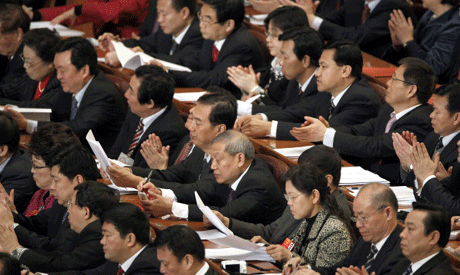
Delegates at National People's Congress in Beijing's Great Hall of the People in China, Wednesday (Photo: AP)
Chinese lawmakers on Wednesday passed into law controversial changes that give the police powers to detain some suspects for up to six months in secret locations known as "black jails".
Detentions in unofficial locations such as hotels or guesthouses in China are well-documented. Last year many people—from renowned artist Ai Weiwei to rights lawyers and petitioners—were illegally held in locations away from formal detention areas, sometimes for months.
But critics say the amendments to China's Criminal Procedure Law would legalise the practice for people considered a threat to the Communist Party such as political dissidents, dozens of whom were detained last year.
The bill was passed at the final session of the National People's Congress, with 2,639 delegates voting in favour of the amendments. Only 160 lawmakers opposed the bill, and 57 abstained from the vote.
"The legislation would provide dangerous exemptions from due process for entire categories of criminal suspects, including those who simply wish to peacefully express their opinion," Amnesty International said in a statement.
The proposed amendments caused a storm of protest from rights groups and judicial reformers when details first emerged in 2011, and have since been watered down.
A new clause in the latest draft would oblige police to inform relatives of those held outside formal detention centres within 24 hours of their detention, although it is not clear whether the location would be disclosed.
Liu Xiaoyuan, a lawyer and friend of Ai Weiwei, said in his blog that the modification from the original draft was "obvious progress."
"But when all is said and done, the law is only written on paper, and the crux is whether law enforcement agencies strictly respect it," he said.
China uses three methods of locking up suspects—formal arrest, formal detention and "residential surveillance", which can be at home or in other locations, usually hotels or guesthouses.
In the first two cases, suspects are held in formal areas of detention such as police stations or prisons.
The controversy focuses mainly on the latter, where there is little accountability and where critics say police may feel freer to use torture.
The amended law for the first time includes a clause to allow police to hold some people under "residential surveillance" away from home for up to six months.
This form of detention is limited to people suspected of terrorism, endangering national security or serious bribery, where holding them under surveillance at their homes would impede investigations.
But activists point out that the charge of endangering national security is not clearly defined, and is regularly used to silence government critics.
Rights groups and legal scholars however say other amendments to the criminal law are positive.
Human Rights Watch—while strongly critical about the secret detention clause—said it welcomed provisions that could "strengthen procedural protections and due process for ordinary criminal suspects."
The group said this included "stricter time limits for detentions, better guarantees for access to a lawyer, and greater protection for juvenile and mentally ill defendants."
Short link: